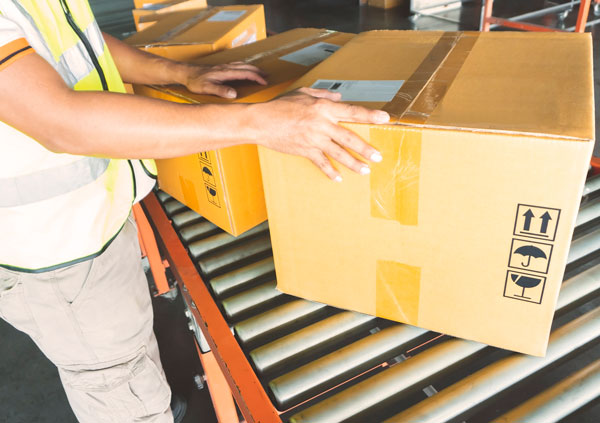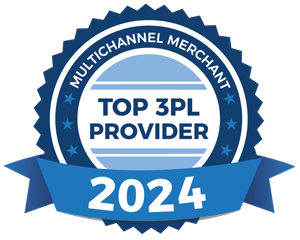Understanding eCommerce Fulfillment and Using it to Grow Your Sales
Companies that have products to sell in these ever-changing times have no choice but to go to market in different ways. eCommerce is no doubt the sales channel with the biggest growth over the past several years, and its sales power keeps rising. That said, a company’s long-term success is only as strong as their ecommerce fulfillment operations – even if they have an amazing product, a great website, and effective marketing.
Understanding the inner workings of ecommerce order fulfillment services and the benefits of using a third-party ecommerce fulfillment partner can help your business achieve faster order processing and delivery, more satisfied customers, and higher sales.
What is eCommerce Fulfillment?

So, what exactly is ecommerce fulfillment? It’s all the operations that are involved in storing your products, processing and shipping online orders, and getting those orders delivered to your customers. It also includes processing any customer returns.
There are many different and complex layers to fulfillment operations, but the key aspects that we’ll review more closely are:
- Technology Integration
- Inventory Management
- Pick/Pack/Ship
- Returns Processing
Each of these steps plays a key role in how smooth your eCommerce fulfillment services run. Any disruption from one step to the next can be problematic to your fulfillment workflow.
These steps also apply to both business-to-business/B2B orders (shipping products from warehouse to larger retailers and big-box chains) and business-to-consumer/B2C orders (shipping directly from the warehouse to the online shopper).
The Pillars of eCommerce Order Fulfillment Services

Here’s a closer look at the four key pillars of ecommerce fulfillment:
Technology Integration
The portfolio of technologies that merchants need to effectively carry out their ecommerce fulfillment is complex. Many have an order management system (OMS) or distributed order management system (DOM). Many also have a customer relationship management systems (CRM) as well as systems for forecasting, inventory, and warehouse management. The key to effective ecommerce, however, is making sure all these tech systems work together seamlessly. This is much easier said than done, and it can be a challenge for businesses to manage it all on their own.
Inventory Management
Inventory management within the ecommerce fulfillment process is about the management of all your goods – receiving the inventory, stocking it, monitoring it, and proactively reordering to prevent backorders or other delays in your fulfillment chain. Another key to preventing delays is to make sure inventory is placed into stock as quickly as possible after receiving it. Inventory management is one pillar where merchants often fall short in their ability to effectively manage it.
Pick/Pack/Ship
The pick, pack, ship process of an ecommerce order fulfillment center goes like this: once an online order comes in, the correct products are picked from your inventory. This is done through a pick list – a physical or digital document that shows what ordered items need to be pulled from inventory. The packing process involves putting all ordered items into the appropriate box or mailer based on product dimensions and the carrier being used. Adding packing materials (bubble wrap, etc.) and paperwork (order receipt, merchandise return label, etc.) is also part of the packing process. After picking and packing, carriers pick up the orders and ship them to customers.
Returns Processing
In recent years, returns from online purchases have increased more than 50%, so never underestimate the importance of a good returns processing (reverse logistics) program. The most important aspects of effective returns processing include having a clear, simple return policy posted on your website; customer return labels that are emailed to the customer or included with their order; product inspection upon return; credit reconciliation; product disposition; repackaging and restocking; and disposal or replenishing.
Meet Customer Expectations with eCommerce Third-Party Fulfillment Support
With growing online sales, more companies are finding it a challenge to go it alone and manage their ecommerce order fulfillment center with internal resources. Why? Because the pillars discussed can be challenging to manage with internal resources.
Another driver behind using an expert third-party provider is shifting consumer expectations. Online shoppers want it all – great prices, free shipping, fast delivery, and flexible and easy-to-follow returns process.
Here are some recent findings about the behavior of today’s online shoppers:
- By 2023, retail purchases are predicted to rise another 22%
- A whopping 80% of people can be discouraged by an inconvenient returns policy
- Over 40% of abandoned shopping carts are attributed to high shipping costs
Because the online consumer reigns supreme and internal fulfillment management is becoming more complicated, more merchants are choosing to outsource their ecommerce fulfillment operations to a third-party logistics provider (also known as a 3PL).
The Rise of the eCommerce Fulfillment Market
In 2019, ecommerce fulfillment market size surpassed 1 trillion dollars (USD). It’s predicted to grow at a Compound Annual Growth Rate (CAGR) of 9% between 2020 and 2026 – which puts us at a 1.8 trillion value projection in just 6 years.
Besides growing online sales, there are other factors contributing to this unprecedented growth in the use of third-party logistics:
- Increased globalization is driving the need for more value-added services and complex logistics management
- Challenging shipper-carrier relationships are driving merchants to seek out expert resources to help navigate current conditions
- Fulfillment technology requirements are increasing the need for sophisticated systems that can provide more data sharing, transparency, and automation from all players in the fulfillment space
The Benefits of Third-Party eCommerce Fulfillment
From small businesses and startups to large-scale operations, companies of all kinds that choose to outsource their ecommerce fulfillment will gain a competitive advantage in the marketplace.
Here are some of the biggest benefits to outsourcing ecommerce fulfillment to a third-party expert:
Minimized overhead. Working with an experienced third-party logistics partner gives you a valuable core resource for your fulfillment operations and frees you of additional infrastructure and overhead.
Time savings. Turning your operations over to a third party reduces the amount of time you spend on fulfillment and increases the amount of time you have to focus on the other core aspects of your business such as marketing, research, and sales.
Reduced costs. There is significant cost savings to gain from working with an ecommerce fulfillment partner. In fact, PFC clients have historically decreased their program costs by 30% or more.
Scalable operations. Companies supported by 3PLs can more easily respond to the peaks and valleys of their online sales and scale the scope of their fulfillment operations accordingly.
Advanced technology. 3PL have best-in-class technologies that integrate seamlessly with your shopping carts and platforms, as well as with major retailers through EDI. This delivers efficient and reliable operations throughout your supply chain.
Greater reach. The distribution networks that third-party fulfillment centers have access to allow merchants to enjoy expanded shipping options and critical same-day ecommerce shipping – which gets orders to customers faster.
Industries That Benefit From Using an eCommerce Fulfillment Partner

Here are some of the industries that are known to outsource their ecommerce fulfillment operations. PFC works with clients in all these categories:
Fashion. Children’s Apparel, Women’s Lingerie, Women’s Apparel, Men’s Apparel
Supplements. Vitamin Supplements, Health Supplements, Children’s Health Supplements, Women’s Health Supplements, Men’s Health Supplements
Cosmetics. Women’s Cosmetics, Women’s Beauty Products, All-Natural Cosmetics, Organic Cosmetics
Subscription Box Services. Health & Beauty, Cosmetics, Children’s, Games, Women’s, Men’s
Questions to ask a Potential eCommerce Fulfillment Partner
If you’re spending too much time managing your ecommerce orders and have insufficient manpower, inventory space, and technologies to support smooth operations, then it’s a great time to seek the help of an ecommerce third-party fulfillment partner.
Here are some questions to consider as you go through the vetting process:
Where are your distribution centers located?
eCommerce fulfillment centers should be in a location where they can quickly ship to your customers, regardless of customer location. Look at the top zip codes in your online order history and find out what the 3PL’s average costs and time in transit are for your top delivery points.
What type of products do you ship?
There are many types of 3PLs. Some cater to small business and startups, and some specialize in large-size items. Others are experts in handling hazardous materials, while others focus on food or beverage products. Ask your potential 3PL what their specialty is and make sure they have experience in fulfilling the types of products you sell.
What kind of shipping discounts can you offer?
Ask for details about their shipping network and what type of discounts are available to you. Of course, good partnerships and negotiating capabilities with the big three carriers (UPS, FedEx, USPS) are a must. But find out what other internal processes the 3PL has in place for reducing their customers’ shipping costs. For example, PFC’s small parcel shipping analysis can help significantly reduce the shipping costs of a small parcel shipment, sometimes by as much as 50%.
Do you offer special value-added services?
Some ecommerce order fulfillment centers can pick, pack, and ship your product but offer special kitting and assembly services like gift wrapping, package personalization, shrink-wrapping, banding, or other custom packaging. If you currently need services such as these, or anticipate you’ll need them in the future, then choose a partner that has these value-add capabilities.
What reporting and analytics tools are available to your customers?
Any reputable ecommerce fulfillment partner will have sophisticated technology systems so merchants can access reports and real-time analytics and assess the most critical parts of their fulfillment operations, at any time. This includes having real-time data for customer orders, inventory counts, shipping reports, order deliveries, and returns.
About PFC – An Experienced eCommerce Fulfillment Partner
At PFC, our clients’ success is our #1 priority. Since 1974, our team has delivered outstanding quantifiable results, with turnkey solutions in ecommerce & web fulfillment, and contact center services – all backed by leading technology. Retailers and ecommerce brands that partner with PFC have historically achieved considerable cost savings in excess of 35% and have significantly improved their program ROI.
Learn more about PFC’s eCommerce fulfillment solutions or email us at info@pfcfulfills.com.

